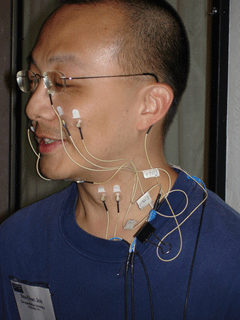Emerging Science Note
Air Date: Week of January 5, 2007

Carnegie Mellon University PhD student Szu-Chen (Stan) Jou
Scientists are building a new device that instantaneously translates mouthed words into a foreign language. Jennifer Percy reports.
Transcript
[SCIENCE NOTE THEME]
Imagine being able to speak another language by silently mouthing the words in English. A translator created by researchers at Carnegie Mellon University promises to do just that.
The device uses a series of electrodes attached to the face and neck that interpret the muscle movements of a speaker. These movements create electrical signals, which are interpreted into English and translated by a computer into another language. The translation is then broadcast in a synthetic voice. Here’s an example:
[AUDIO TRANSLATION]
Existing translators make conversation difficult because they require the user to speak out loud and then push a button to create the translation. The new apparatus allows for a more natural exchange. Researchers say the effect would be like watching an American television show dubbed in a foreign language.

Carnegie Mellon University PhD student Szu-Chen (Stan) Jou demonstrates the prototype at a press conference. (Courtesy of Carnegie Mellon University)
The new translator is more accurate because the electrodes detect not just words but phonemes—or the sounds that form words. English, for example, has only has 45 phonemes. The device memorizes the phonemes of a language and uses these as a base to construct a potentially limitless vocabulary.
But right now, the translator is accurate only 62 percent of the time. Researchers hope to make the translator more reliable by programming it to voice doubt. But for now it looks like some things will remain lost in translation.
That’s this week’s note on emerging science, I’m Jennifer Percy.
Links
Living on Earth wants to hear from you!
Living on Earth
62 Calef Highway, Suite 212
Lee, NH 03861
Telephone: 617-287-4121
E-mail: comments@loe.org
Newsletter [Click here]
Donate to Living on Earth!
Living on Earth is an independent media program and relies entirely on contributions from listeners and institutions supporting public service. Please donate now to preserve an independent environmental voice.
NewsletterLiving on Earth offers a weekly delivery of the show's rundown to your mailbox. Sign up for our newsletter today!
 Sailors For The Sea: Be the change you want to sea.
Sailors For The Sea: Be the change you want to sea.
 The Grantham Foundation for the Protection of the Environment: Committed to protecting and improving the health of the global environment.
The Grantham Foundation for the Protection of the Environment: Committed to protecting and improving the health of the global environment.
 Contribute to Living on Earth and receive, as our gift to you, an archival print of one of Mark Seth Lender's extraordinary wildlife photographs. Follow the link to see Mark's current collection of photographs.
Contribute to Living on Earth and receive, as our gift to you, an archival print of one of Mark Seth Lender's extraordinary wildlife photographs. Follow the link to see Mark's current collection of photographs.
 Buy a signed copy of Mark Seth Lender's book Smeagull the Seagull & support Living on Earth
Buy a signed copy of Mark Seth Lender's book Smeagull the Seagull & support Living on Earth

